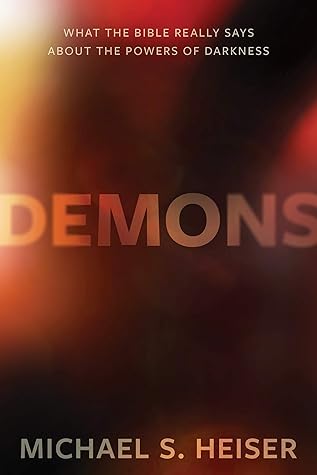More on this book
Kindle Notes & Highlights
Read between
August 30 - September 13, 2024
Another example is the oft-repeated belief that Satan and one-third of the angels of heaven rebelled against God before the creation of humankind. This idea is prevalent throughout Christian tradition despite the fact that such an episode appears nowhere in the Bible. The only passage that comes close is Revelation 12:4, a passage dealing with the birth of the Messiah, thousands of years after the primeval period.
The Old Testament writers linked the rebellion of supernatural beings with the mirror-opposition to the eternal, joyful life intended by the creation of earth and humanity. A loving God created the earth as his own abode-temple,1 intending humanity to be part of his family. Supernatural mutinies brought death, disaster, and disease to earth. Instead of all the earth becoming sacred space, darkness permeated the world.
for evil spirits are members of God’s heavenly host who have chosen to rebel against his will.
For the purposes of the present study, the point to be made is that the biblical Rephaim are supernatural residents of the underworld, a place in the spiritual plane of reality dissociated with the presence of God.
the Old Testament theology of afterlife included hope but conveyed uncertainty about when the hoped-for release would occur.
[God] chose Israel that they might be a people for himself. And he sanctified them and gathered them from all of the sons of man because (there are) many nations and many people, and they all belong to him, but over all of them he caused spirits to rule so that they might lead them astray from following him. But over Israel he did not cause any angel or spirit to rule because he alone is their ruler. (Jubilees 15:30b–32a; OTP, 2:87)
two groups of sinister divine beings that have completely different origins in Old Testament and Second Temple Jewish thought get lumped together.
The point is that, for ancient people—including Israelites—gods and their idols were closely related but not identical.
We will devote two chapters to each rebellion: the serpent of Genesis 3 (chapters 3–4), the sons of God of Genesis 6:1–4 (chapters 5–6), and the sons of God allotted to the nations at Babel, described in Deuteronomy 32:8–9 (chapters 7–8).
temples are where gods live. Eden was the abode of God, “an earthly archetype of the heavenly reality.”6 “Because Adam communed with God in Eden,” Wenham adds, “the latter was the temporal analog for the celestial archetype.”7
other scholars disagree with this approach. They assert that Isaiah 14:12–15 and Ezekiel 28:1–19 are only about the kings of Babylon and Tyre and cannot inform us about the fall in Genesis 3. For them, Adam’s sin serves as an analogy for the downfall of these two kings. Adam becomes the focus of the hubris and fall described by the two prophets. These passages do not inform our understanding of the divine rebel in Eden.28
The Hebrew word śāṭān, commonly transformed into the personal name “Satan,” is actually no such thing: this Hebrew term is not a proper personal noun and therefore does not point to the specific figure we know from the New Testament as Satan.
While ancient Israelites did not use the Hebrew term śāṭān for the nāḥāš of Genesis 3, it is clear that he was an adversarial figure in the flow of biblical history—a hostile entity to the purposes of God.
In biblical cosmology, the underworld (as its name suggests) is in or under the earth. It is consequently part of the earth.
What marks the profile of the first divine rebel? Hubris toward God, antipathy toward humanity, and dominion over the dark realm of the dead.
The concept is straightforward: when there is disorder in the divine realm, when the members of Yahweh’s council are not in harmony with his will, misery, chaos, injustice, and death on earth are the result.
In short, Jesus never appealed to a higher power to cast out a demon, unlike the common procedure in other exorcism texts. The power to command evil spirits resided within him as God incarnate, the Son of the Most High.25
The story of the book of Acts is nothing less than the liberation of the peoples of the world held captive by the gods of the nations who enslaved them in their idolatry and unbelief. Jesus’ acts of power in gentile regions and Acts 1:8 were early indications as to what the new covenant entailed (Jer 31:31–33; Ezek 36:25–28).
There isn’t a single verse in the entirety of Scripture that tells us (a) the original rebel sinned before the episode of Genesis 3, or (b) a third of the angels also fell either before humanity’s fall or at the time of that fall. There is only one passage that mentions a “third” of the angels (presumably) and Satan/the serpent in tandem (Rev 12:1–9):
There is no scriptural evidence that members of the heavenly host know a person’s mind or thoughts the way God does.
Jesus never commanded that his followers confront spiritual entities.36 Instead he gave the Great Commission.
The Great Commission is thus a comprehensive plan for spiritual warfare.
Instead, here is what Paul considered effective in spiritual combat against the forces of darkness: •truth (v. 14) •righteousness (v. 14) •the gospel (v. 15) •faith (v. 16) •salvation (v. 17) •the word of God (v. 17) •prayer (v. 18) •perseverance (v. 18)
It is not difficult to see that, instead of power encounters, spiritual warfare in Ephesians 6 is about having persevering faith in the gospel and the word of God and living a holy, prayerful life as a follower of Jesus.


